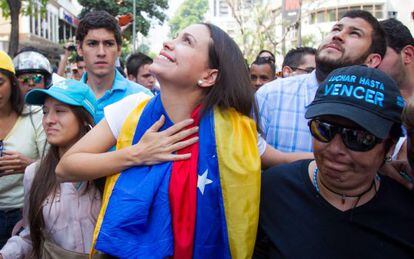Maduro vows severe punishment for generals who tried to overthrow him
Doubts begin to surface whether there was actually a coup plot by the air force Opposition leader Machacho returns to Venezuela to fight to keep her assembly seat

Two days after Venezuelan President Nicolás Maduro announced the arrests of three air force generals for reportedly plotting to overthrow his government, some sectors have begun to cast doubts as to whether such a conspiracy actually existed.
During an address to commemorate the 20th anniversary of the release from prison of his predecessor and mentor, the late Hugo Chávez – who led the unsuccessful 1992 coup to overthrow President Carlos Andrés Pérez – Maduro vowed to severely punish the three officers, along with anyone else who was part of the alleged plot.
“I have ordered a complete investigation,” he said. “If the evidence we have is true, I am going to apply the law in the strictest manner against those involved, in the name of the Bolivarian National Armed Forces.” Nevertheless, just moments prior he admitted that he would be “the first to say he is happy” if the generals were acquitted.
On Tuesday, the Venezuelan president made the surprise announcement of the capture of the three air force officials at a meeting with members of a fact-finding mission from Union of South American Nations (Unasur), which traveled to Venezuela to investigate the ongoing social unrest. Without offering details, he said that the generals were immediately turned over to a military tribunal.
The names of the three men have not been released but the Caracas daily Últimas Noticias identified them as Oswaldo Hernández Sánchez, the head of an air force division who was reportedly the leader of the plot, and brigadier generals Carlos Alberto Millán Yaguaracuto and José Daniel Machillanda Díaz.
Lawyer Rocío San Miguel, the director of the NGO Citizens Control, said she was not permitted to see the detained men on Monday night at the military intelligence division in Caracas, even though she was kept waiting for about 30 minutes.
But San Miguel did confirm that the generals were not turned over to a military tribunal as the president originally said. Under the Constitution the officers must be given a pre-trial hearing by the Supreme Court before they can be put on trial. The president corrected his earlier statement and affirmed that the three were still under investigation.
Many sectors began to question the real motives behind their arrests. Doubts also surfaced on whether the three were actually capable of leading a coup. Military analysts maintain that the air force doesn’t have the power to carry out an overthrow without the army’s support.
In April 2002, the general and admirals who led a brief coup against Chávez didn’t have full control of army troops. After businessman Pedro Carmona, who assumed the presidency, dissolved the public institutions by decree, the coup was put down by the troops loyal to Chávez. Carmona and the military leaders went into exile.
“Despite the incident, the Bolivarian National Armed Forces remain monolithic, and nothing will go against our democratic convictions,” the military said in a statement after the arrests.
Lawyer San Miguel cannot explain why the three were detained. They had been promoted by the late Chávez upon recommendations and were considered loyal supporters.
Machado to fight to keep seat
In a related event on Wednesday, María Corina Machado, the opposition leader who this week was kicked out from the National Assembly, told her supporters that she would fight to keep her seat, and “until liberty and democracy are installed” in Venezuela.
Machado, who is seeking Maduro’s ouster, was met by about 300 supporters on her return to Caracas from Lima where she attended a freedom seminar sponsored by Nobel Prize-winning author Mario Vargas Llosa. Before that, she had tried to address the Organization of American States (OAS) in Washington about the situation in Venezuela, but was denied the floor after delegations from leftist regional nations that are allies with the Maduro government voted to prevent her from speaking.
The Panamanian government had given Machado a spot with its delegation – a move that infuriated National Assembly speaker Diosdado Cabello, who announced that she automatically lost her seat as a deputy because she had accepted a post with a foreign government.
“As for [Cabello], I will tell him: I am a deputy because the people of Venezuela wanted it that way and I will continue to serve them,” she told her cheering supporters at a rally held in Caracas’ Brión square, which is a symbolic meeting point for the opposition.
“A deputy can only be replaced because of death, resignation, or through a final revocation ruling by a Venezuelan court,” she explained.
Machado has vowed to attend the next National Assembly meeting this week, despite Cabello’s threats that she will be prevented from entering the doors to the capitol exclusively used by lawmakers.
Deputies from the ruling United Socialist Party of Venezuela (PSUV) have asked the Attorney General’s Office to conduct a preliminary investigation into Machado for treason and fomenting violence. Machado and her jailed opposition partner, Leopoldo López, called for nationwide anti-government demonstrations on February 12, which have since snowballed into massive daily protests across the country.










































